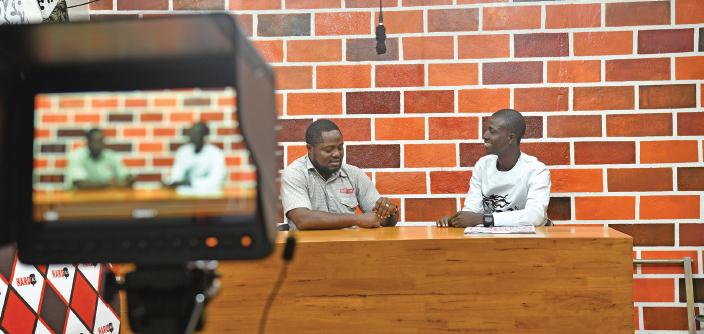China inspired Liberia's new media pioneer


His company's livestreams of election activities have helped push African country's digital migration
More than four years ago, a young Liberian embarked on a journey to China that would inspire him to become his country's leading new media pioneer.
Randall Jackson, 37, participated in a 10-week training course in digital migration at China Central Television's English-language news channel, now known as China Global Television Network, or CGTN.
Although it was a short study course for Jackson and many of his colleagues who also attended, he still savors the skills he acquired and continues to use them for the success of his own media company.
His trip to Beijing came at the time when Liberia was lagging in digital or new media, so he was among those who felt obliged to help push the West African nation into a new epoch of media convergence.
"I learned a lot of good things that I'm using today. I also had the privilege to visit the garden city of Dalian and get to see some of China's innovative technologies and how they were impacting that country," Jackson recalls during an interview in his studios in downtown Monrovia, the capital of Liberia.
"My specific interest was in digital media, because I wanted to bring that idea to Liberia," Jackson says.
Jackson is now credited with being a pioneer in Liberia's new media television, after setting up a small company, Kreative Mindz Television, or KMTV.
His crew of 10 uses portable but sophisticated equipment to disseminate on-the-spot news and information to the company's audience on the popular social media platform - Facebook.
He sees his innovation as a complete breakaway from traditional news reporting.
Jackson's KMTV made a breakthrough when it entered the country's media landscape late last year by livestreaming almost every political event held in Monrovia.
Online television became the go-to place for coverage of election activities and also reached hundreds of thousands of Liberians living abroad.
His company was later recognized by international election observers at the end of the country's election for its outstanding coverage.
He made another massive inroad to the country's media landscape when KMTV livestreamed a major regional soccer competition hosted in Liberia.
Viewership and the number of subscribers are increasing weekly. In July, KMTV had more than 773,000 viewers, with 2,000 new subscribers.
Jackson is now opting to turn KMTV into a full-time online television network by producing content to serve diverse audiences.
He's optimistic about Liberia's prospects in the new media industry within the next decade. "Every Liberian will start to own a good (smart) phone which is not expensive, and it might even get cheaper," he says.
According to the Liberian government, the country has mobile internet penetration of around 16 percent.
"I think it's (new media) going to grow fast, based on how internet is increasing in the country, and later on we could work with GSM (global system for mobile communications) companies, use their towers," says Jackson.
Jackson says sharing "Chinese wisdom" with his team is also an obligation. He says more opportunities for young Liberians to study in China would help expand his country's new media sector.
Jackson says his Beijing memories are still fresh, including his visits to CCTV studios and to facilities of the companies Huawei and Dayang.
These Chinese tech companies triggered his passion for smart devices, he says.
"One thing that caught (my attention) was the time it takes for information to get to people who need it," he says of Chinese new media, adding that he became fascinated by broadcasting audio-visual news content as it happens.
Jackson says he loves the Chinese language and philosophy as well as the country's technology and innovation.
"I still want to know more about digital media, especially to take it a step further. I still believe that there is a lot more to know about new media and what it's all about. ... China, to me, is the best place to learn more about new media.
"Things I saw there are coming to Liberia," he adds. "I think my going there was one reason I was able to innovate so that Liberians can have social media TV today."































